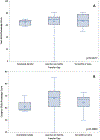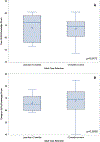Assessment of transition readiness to predict health care utilization during transition to adult care in sickle cell disease
- PMID: 36356169
- PMCID: PMC9809157
- DOI: 10.1080/17474086.2022.2144216
Assessment of transition readiness to predict health care utilization during transition to adult care in sickle cell disease
Abstract
Background: Transition-age patients with sickle cell disease (SCD) are at risk for poor outcomes associated with incomplete transition readiness and neurocognitive deficits. Study objectives were to: 1) test if a SCD-specific measure of self-management skills was associated with transition outcomes and 2) evaluate if caregiver-reported executive functioning was associated with self-management skills and transition outcomes among youth with SCD.
Research design and methods: Youth/caregivers were selected from a longitudinal cohort study. Caregivers completed the Behavior Rating Inventory of Executive Function (BRIEF); caregivers and youth completed the Self-Management Skills Checklist (SMSC) at a median age of 16.8 ± 0.6 years. Non-parametric tests compared SMSC and transition outcomes. Regression assessed the incremental validity of SMSC in predicting transition outcomes.
Results: In total, 95 participants (54% male, 55% severe genotype) completed the SMSC assessment. Most participants (87%) transferred to adult care within six months and 87% were retained for at least 12 months. BRIEF and caregiver-reported SMSC assessments were weakly, negatively correlated (ρ = -0.25, p = 0.0392) but were not significant in predicting transition outcomes (p > 0.05).
Conclusions: The SMSC and executive function did not predict adult care engagement. Development of readiness assessments that predict care engagement and reflect self-efficacy is important for monitoring transition-aged patients with SCD.
Keywords: Executive functioning; Health Care Transition; self-management skills; sickle cell disease; transition readiness.
Figures
Similar articles
-
The Kennedy Krieger Independence Scales-Sickle Cell Disease: Executive components of transition readiness.Rehabil Psychol. 2017 Aug;62(3):249-257. doi: 10.1037/rep0000158. Rehabil Psychol. 2017. PMID: 28836806
-
The Adolescent and Caregiver Sickle Cell Disease Self-management Skills Checklist: Preliminary Reliability and Validity.J Pediatr Hematol Oncol. 2020 Jan;42(1):12-19. doi: 10.1097/MPH.0000000000001618. J Pediatr Hematol Oncol. 2020. PMID: 31688630
-
Self-efficacy and readiness for transition from pediatric to adult care in sickle cell disease.Int J Adolesc Med Health. 2016 Nov 1;28(4):381-388. doi: 10.1515/ijamh-2015-0014. Int J Adolesc Med Health. 2016. PMID: 26226116
-
A program of transition to adult care for sickle cell disease.Hematology Am Soc Hematol Educ Program. 2019 Dec 6;2019(1):496-504. doi: 10.1182/hematology.2019000054. Hematology Am Soc Hematol Educ Program. 2019. PMID: 31808907 Free PMC article. Review.
-
Neurocognitive risk in sickle cell disease: Utilizing neuropsychology services to manage cognitive symptoms and functional limitations.Br J Haematol. 2022 May;197(3):260-270. doi: 10.1111/bjh.18041. Epub 2022 Feb 4. Br J Haematol. 2022. PMID: 35118643 Review.
Cited by
-
Transition readiness assessment in adolescents and young adults with chronic intestinal failure on home parenteral nutrition: A descriptive cross-sectional study.JPEN J Parenter Enteral Nutr. 2025 Jul;49(5):599-608. doi: 10.1002/jpen.2747. Epub 2025 Apr 8. JPEN J Parenter Enteral Nutr. 2025. PMID: 40197659 Free PMC article.
References
-
- Piel FB, Steinberg MH, Rees DC. Sickle Cell Disease. N Engl J Med. 2017. Apr 20;376(16):1561–1573. - PubMed
-
- Hassell KL. Population estimates of sickle cell disease in the U.S. Am J Prev Med 2010. Apr;38(4 Suppl):S512–21. - PubMed
-
- Charache S, Terrin ML, Moore RD, et al. Effect of hydroxyurea on the frequency of painful crises in sickle cell anemia. New England Journal of Medicine. 1995;332(20):1317–1322. - PubMed
-
- Chaturvedi S, DeBaun MR. Evolution of sickle cell disease from a life-threatening disease of children to a chronic disease of adults: The last 40 years. Am J Hematol. 2016. Jan;91(1):5–14. - PubMed
Publication types
MeSH terms
Grants and funding
LinkOut - more resources
Full Text Sources
Other Literature Sources
Medical


